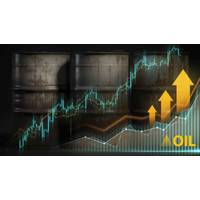Oil Prices Spike on Iraq Anxiety, Stocks Dip
- Brent at 3-mo high, U.S. crude hits highest since September
- Kiwi jumps the most in four months after rate hike
- U.S. shares dip after data, but energy stocks up
Crude oil prices spiked on Thursday on worries over supply as violence escalated in Iraq, while a worldwide equities gauge edged down after Wall Street opened lower.
Crude jumped after Iraqi Kurdish forces took control of the northern oil city of Kirkuk, in the face of a triumphant Sunni Islamist rebel march towards Baghdad that threatens Iraq's future as a unified state.
Brent crude futures rose the most in more than three months to a high of $112.34 a barrel, the highest since early March. U.S. crude added 1.7 percent to its highest since September. Prices could rise further as events unfold in Iraq.
"There are no immediate oil export implications in as much as the latest news is about Kirkuk ... and that has a limited impact because the northern pipeline has been down for months already," said Gareth Lewis-Davies, a strategist at BNP Paribas.
"This is more about uncertainty as it calls into question the ability of the central Baghdad government to keep control," he said. "The big fear is if they get south of Baghdad ... but there is no immediate indication that this will happen."
On Wall Street, stocks opened lower after U.S. retail sales rose less than expected in May and first-time applications for unemployment benefits increased last week.
The decline was partly offset by higher prices in energy stocks on the heels of the spike in oil prices.
The crude spike "is a significant move but not enough to impact economic growth here in the U.S., at least not yet," said Phil Orlando, chief equity market strategist at Federated Investors in New York.
"We're going to have to go a lot higher than $106 (on WTI)for that to bite."
The Dow Jones industrial average fell 44.83 points or 0.27 percent, to 16,799.05, the S&P 500 lost 5.93 points or 0.31 percent, to 1,937.96 and the Nasdaq Composite dropped 14.73 points or 0.34 percent, to 4,317.21.
The FTSEurofirst 300 index of top European shares was flat, not far from the 6-1/2 year high of 1,398.65 peak hit earlier this week. MSCI's global stocks gauge fell 0.1 percent.
The New Zealand dollar jumped the most in four months to hit its highest since mid May after the central bank raised interest rates and kept a hawkish bias. The kiwi surged 1.6 percent to $0.8680.
The euro hit a low of $1.3510 against the U.S. dollar, near the low of $1.3503 hit on Thursday after the European Central Bank cut rates, before rebounding on the weaker-than-expected U.S. data. The euro is, however, set to post its fifth week of losses versus the dollar in the last six.
In fixed income, U.S. Treasuries edged up marginally in price after the soft data, though the generally upbeat view on the U.S. economy remains. Markets continue to look forward to a Federal Reserve meeting next week. Fed Chair Janet Yellen is expected to be pressured on the timeline for rate hikes in a press conference on Wednesday.
"The numbers won't change the outlook for the Fed meeting next week. It's not a big enough of a miss," said Stanley Sun, interest rate strategist, at Nomura Securities in New York.
U.S. 10-year notes were up 2/32 in price to yield 2.633 percent, from 2.641 percent late on Wednesday. Yields hit session lows of 2.624 percent after the U.S. data.
(Reporting by Rodrigo Campos, additional reporting by Gertrude Chavez-Dreyfuss in New York and Lin Noueihed in London)





